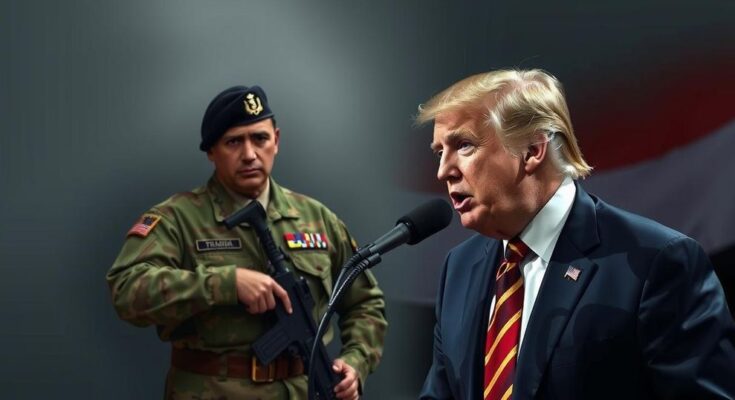Robert F. Kennedy Jr. revealed that President-elect Donald Trump plans to withdraw U.S. troops from northern Syria, labeling them as potential casualties in a Turkish-Kurdish conflict. During an informal discussion, Trump expressed concerns about the safety of American forces stationed near the volatile border, urging for their removal. This announcement follows his recent election victory and indicates a possible re-evaluation of U.S. foreign policy in the region, particularly regarding support for the Kurdish forces against IS.
During a recent live broadcast with Tucker Carlson, Robert F. Kennedy Jr. shared that Donald Trump intends to withdraw U.S. troops from northern Syria, referring to them as potential “cannon fodder” if conflict escalates between Turkey and Kurdish forces. Kennedy recounted a conversation on a plane where Trump sketched a map of the Middle East, noting the precarious position of American troops along the Syria-Turkey border. Trump indicated significant troop numbers on both sides of the border, emphasizing the U.S. military’s exposure in the event of a confrontation. Kennedy reported that Trump’s military advisers had cautioned him about the risk to U.S. personnel, leading to the directive, “Get them out!” This revelation comes on the heels of Trump’s re-election and raises concerns about potential shifts in U.S. foreign policy, particularly regarding support for the Kurdish forces allied against the Islamic State (IS). Since 2014, the U.S. has supported the Syrian Kurdish People’s Protection Units (YPG), which Turkey views as a terrorist organization. Amid ongoing tensions, Trump’s approach may alter the dynamics of U.S. involvement in the region.
The U.S. military presence in northern Syria has been a contentious issue, particularly given the complex geopolitical landscape involving Kurdish forces, Turkey, and the Syrian government. Since the onset of the Syrian civil war in 2011, the U.S. has backed the YPG as a crucial ally against IS. However, Turkey’s concerns over Kurdish autonomy along its border have led to military interventions aimed at reducing the influence of groups it associates with the PKK, a designated terrorist organization. Trump’s statements reflect a broader scrutiny of U.S. military engagements abroad and a potential pivot in foreign policy that may prioritize troop safety over long-standing alliances.
Robert F. Kennedy Jr.’s commentary on Trump’s military strategy signals a potential shift in U.S. involvement in Northern Syria, with implications for American alliances and regional stability. By advocating for troop withdrawal, Trump is prioritizing the safety of U.S. forces in a volatile region where escalating tensions could lead to dire consequences. This move not only highlights the precarious standing of U.S. troops but also raises questions about the future of U.S. support for Kurdish forces amid Turkey’s aggressive posture. As Trump’s administration unfolds, these developments are likely to shape international relations in the Middle East significantly.
Original Source: www.middleeasteye.net




